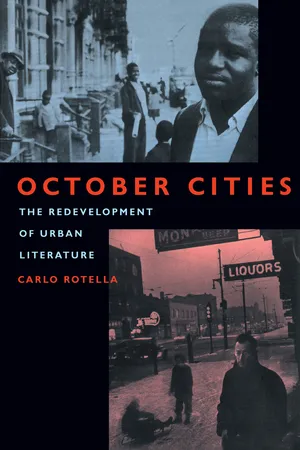
- 384 pages
- English
- ePUB (mobile friendly)
- Available on iOS & Android
About This Book
Returning to his native Chicago after World War II, Nelson Algren found a city transformed. The flourishing industry, culture, and literature that had placed prewar Chicago at center stage in American life were entering a time of crisis. The middle class and economic opportunity were leaving the inner city, and Black Southerners arriving in Chicago found themselves increasingly estranged from the nation's economic and cultural resources. For Algren, Chicago was becoming "an October sort of city even in the spring, " and as Carlo Rotella demonstrates, this metaphorical landscape of fall led Algren and others to forge a literary form that traced the American city's transformation. Narratives of decline, like the complementary narratives of black migration and inner-city life written by Claude Brown and Gwendolyn Brooks, became building blocks of the postindustrial urban literature. October Cities examines these narratives as they played out in Chicago, Philadelphia, and Manhattan. Through the work of Algren, Brown, Brooks, and other urban writers, Rotella explores the relationship of this new literature to the cities it draws upon for inspiration. The stories told are of neighborhoods and families molded by dramatic urban transformation on a grand scale with vast movements of capital and people, racial succession, and an intensely changing urban landscape. This title is part of UC Press's Voices Revived program, which commemorates University of California Press's mission to seek out and cultivate the brightest minds and give them voice, reach, and impact. Drawing on a backlist dating to 1893, Voices Revived makes high-quality, peer-reviewed scholarship accessible once again using print-on-demand technology. This title was originally published in 1998.
Returning to his native Chicago after World War II, Nelson Algren found a city transformed. The flourishing industry, culture, and literature that had placed prewar Chicago at center stage in American life were entering a time of crisis. The middle class
Frequently asked questions
Information
Table of contents
- Cover
- Title
- Copyright
- Contents
- Illustrations
- Acknowledgments
- Introduction: The City of Feeling and the City of Fact
- Part I The Decline and Fall of the Old Neighborhood
- Exposition: The Story of Decline
- The Old Neighborhood: Industrial Chicago and Its Literatures
- Closing Time: The Man with the Golden Arm
- After the End: The Story of Decline as Act One
- Part 2 The Neighborhood Novel and the Transformation of the Inner City
- Exposition: South Street and the Neighborhood Novel
- Urban Village and Black Metropolis: John Fury and South Street
- The Literature of Postindustrial South Street
- Part 3 The City of Feeling in Crisis
- Exposition: That Separate World
- Violence, the Second Ghetto, and the Logic of Urban Crisis
- Checkpoint Frederick Douglass: Warren Miller and the Boundaries of the Ghetto
- The Box of Groceries and the Omnibus Tour: Manchild in the Promised Land
- The War of Position
- Conclusion: Notes from a Cultural Sea Change
- Notes
- Index